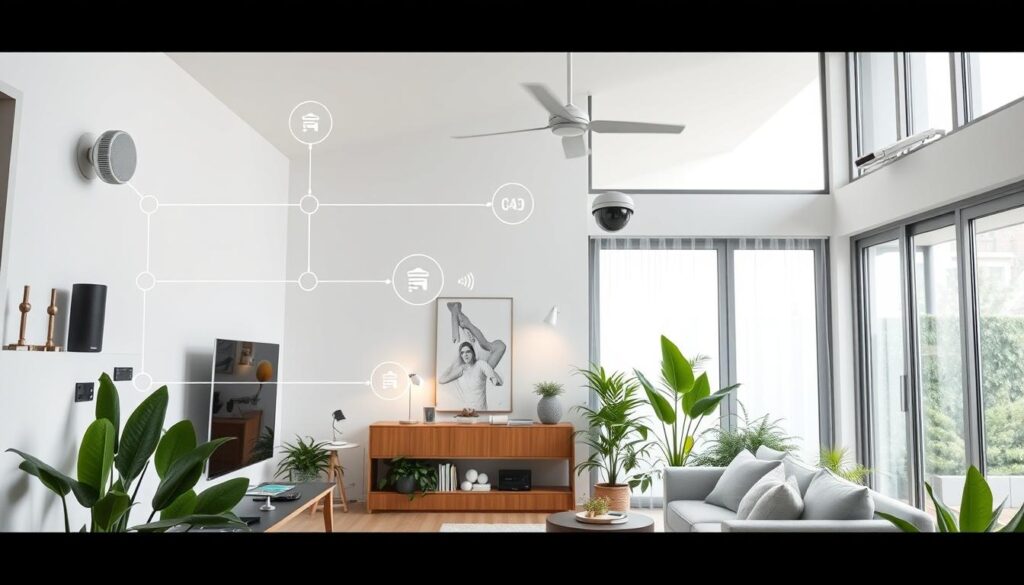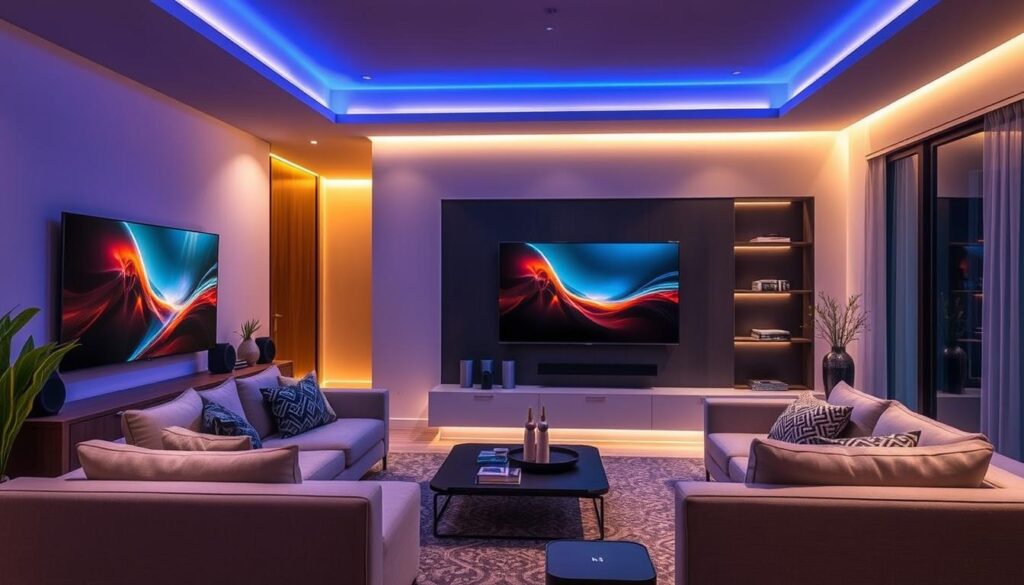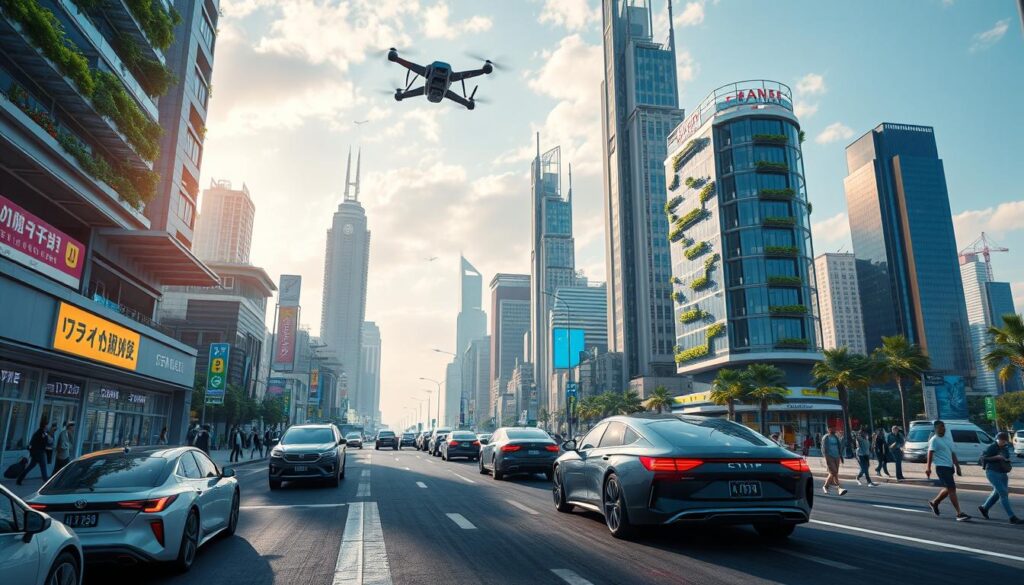The world of home automation is evolving at a rapid pace, ushering in a new era of smart homes that are transforming the way we live. This article explores the cutting-edge advancements in home automation technology and how they are shaping the future of our living spaces. From the seamless integration of the Internet of Things (IoT) to the powerful capabilities of voice assistants, smart home systems are redefining the boundaries of what’s possible in the realm of home living.
The concept of smart homes is centered around the convergence of technology and home management, allowing homeowners to effortlessly control and monitor various aspects of their living environment. This includes everything from security systems and energy efficiency to entertainment and home appliances. The increasing popularity of smart home technology is driven by the desire for greater convenience, enhanced safety, and reduced energy consumption, ultimately leading to a more personalized and efficient home experience.
Key Takeaways
- The future of home automation technology lies in the integration of smart home systems that seamlessly connect various devices and services.
- Voice assistants, such as Alexa and Google Assistant, are playing a pivotal role in driving the adoption and user-friendliness of smart home technology.
- Smart home security systems are revolutionizing the way we monitor and protect our living spaces, offering advanced surveillance and remote access capabilities.
- Energy efficiency is a key focus of smart home automation, with integrated systems that optimize energy consumption and reduce utility costs.
- The home entertainment experience is being transformed by the integration of smart home technology, enabling seamless control and coordination of audio and visual components.
What Are Smart Homes?
In the evolving landscape of home automation, the concept of smart homes has emerged as a transformative force. Smart homes seamlessly integrate a wide range of devices and systems, enabled by the Internet of Things (IoT), to create a connected and efficient living experience. By leveraging advanced technologies, smart homes offer homeowners unprecedented convenience, security, and energy efficiency.
Understanding the Concept of Smart Homes
At the heart of the smart home lies the integration of various electronic devices, sensors, and control systems that communicate with each other through the Internet of Things (IoT). This interconnectivity allows homeowners to remotely monitor, manage, and automate a multitude of household functions, from lighting and climate control to home security and appliance management.
Benefits of Smart Home Technology
- Improved energy efficiency through automated control of HVAC, lighting, and other energy-consuming systems.
- Enhanced security with advanced surveillance, alarm systems, and remote access capabilities.
- Increased convenience and comfort through voice-controlled automation, personalized settings, and seamless integration of home appliances.
- Comprehensive home management from a single, intuitive platform, accessible via smartphones, tablets, or voice assistants.
As the smart home technology continues to evolve, it promises to redefine the way we interact with and manage our living spaces, ushering in a new era of comfort, efficiency, and security.
The Internet of Things (IoT) and Smart Homes
The Internet of Things (IoT) has become the backbone of smart home technology, enabling a seamless integration of various devices, sensors, and systems within the home. This interconnectivity allows homeowners to remotely monitor, control, and optimize their living environment with unprecedented convenience.
At the core of smart home technology lies the IoT, which facilitates the communication and collaboration of connected devices. From home automation systems to home networking solutions, the IoT ensures that every aspect of the home can be intelligently managed and synchronized, providing homeowners with enhanced device integration and a truly smart living experience.
Through the power of the IoT, smart home technology allows homeowners to remotely access and command a wide range of smart home features, from adjusting the thermostat and controlling lighting to monitoring security cameras and managing home appliances. This seamless integration of technology empowers homeowners to create a more efficient, comfortable, and secure living environment.

“The Internet of Things is the network of physical objects or ‘things’ embedded with electronics, software, sensors, and network connectivity, which enables these objects to collect and exchange data.”
As the IoT continues to evolve and become more sophisticated, the potential for smart home technology to revolutionize the way we live is immense. By harnessing the power of interconnected devices and systems, homeowners can enjoy unparalleled control, energy efficiency, and enhanced overall home management.
Voice Assistants: The Driving Force Behind Smart Homes
The rapid advancements in voice recognition and natural language processing have transformed the way we interact with our homes. Voice assistants, such as Alexa and Google Assistant, have emerged as the driving force behind the evolution of smart home technology. These intelligent digital companions have revolutionized hands-free control, enabling homeowners to seamlessly integrate and automate various systems within their living spaces.
Alexa, Google Assistant, and Other Voice Assistants
Leading voice assistants like Alexa and Google Assistant have become the go-to solutions for smart home automation. These virtual assistants can control a wide range of connected devices, including lights, thermostats, security systems, and even kitchen appliances, all through simple voice commands. By leveraging the power of voice control, homeowners can effortlessly manage their smart home technology without the need for manual interaction.
Voice Control and Home Automation
The integration of voice assistants has transformed the concept of home automation. Homeowners can now control their environments with just a few spoken words, making tasks like adjusting the temperature, setting timers, or locking doors a breeze. This hands-free approach to home management has not only enhanced convenience but also promoted a more efficient and secure living experience.
| Voice Assistant | Key Features | Compatible Devices |
|---|---|---|
| Alexa | – Voice control for smart home devices – Integration with Amazon’s ecosystem – Extensive app and skill support |
– Lights, thermostats, security systems – Televisions, speakers, and home entertainment – Appliances and kitchen devices |
| Google Assistant | – Seamless integration with Google’s services – Advanced natural language processing – Integration with a wide range of smart home devices |
– Lighting, climate control, and security – Audio and entertainment systems – Compatible with many third-party smart home products |
The rise of voice assistants has undoubtedly been a game-changer in the realm of smart home technology, empowering homeowners to take control of their living spaces with the power of their voice.
Smart Home Security Systems
As smart home technology continues to evolve, homeowners are increasingly turning to advanced smart home security systems to enhance the safety and protection of their living spaces. These systems leverage cutting-edge features like home surveillance, home monitoring, and remote access to provide a comprehensive layer of security for your home.
Advanced Surveillance and Monitoring
Smart home security systems often include security cameras that can be strategically placed throughout your home, allowing you to monitor activity and receive real-time alerts on your smartphone or tablet. Smart locks integrate seamlessly with these systems, providing you with the ability to remotely control access to your home, even when you’re away.
Motion sensors and other advanced monitoring technologies further bolster the security of your smart home, detecting any suspicious activity and triggering immediate notifications to your devices. This heightened level of home surveillance and monitoring empowers you to stay informed and in control of your home’s security, no matter where you are.
Remote Access and Control
One of the significant advantages of smart home security cameras and smart locks is the ability to access and control them remotely. With a few taps on your smartphone or voice commands to your virtual assistant, you can view live footage, unlock doors, and even receive notifications about potential intruders.
This level of remote access and control over your home’s security and home automation systems ensures that you can respond to any security concerns promptly, providing an invaluable layer of protection for your home and your loved ones.
Energy Efficiency and Smart Home Automation
As the world becomes increasingly conscious of environmental challenges, the integration of smart home automation has emerged as a powerful solution for enhancing energy efficiency and reducing utility costs. Smart home technologies, such as smart thermostats, smart lighting, and comprehensive energy management systems, are revolutionizing the way we approach home energy consumption.
Smart thermostats, for instance, learn your household’s temperature preferences and adjust heating and cooling accordingly, optimizing energy usage and minimizing waste. Similarly, smart lighting systems automatically adjust brightness and turn off lights when not in use, contributing to significant cost savings on your energy bills.
Beyond individual devices, whole-home energy management systems consolidate data from various smart home components, providing homeowners with a comprehensive view of their energy consumption. This enables informed decision-making and the implementation of tailored strategies to further enhance energy efficiency and reduce their environmental footprint.
“Smart home automation is not just about convenience—it’s about creating a more sustainable and cost-effective living environment for homeowners.”
By seamlessly integrating these smart home automation technologies, homeowners can enjoy the benefits of a more comfortable, efficient, and environmentally friendly living space, all while potentially seeing a reduction in their monthly utility bills.
Home Entertainment Systems in the Smart Home Era
The smart home revolution has transformed the way we experience home entertainment. Smart home technology has seamlessly integrated audio and visual components, creating an immersive and personalized entertainment experience. From smart TVs and smart speakers to whole-home audio and video control, the integration of smart home entertainment systems has become a central focus in the modern smart home.
Seamless Integration of Audio and Visual Components
Today’s smart home entertainment systems go beyond traditional home theater setups. Smart TVs, equipped with advanced features and internet connectivity, allow homeowners to access a vast array of streaming content, while smart speakers provide whole-house audio control and voice-activated commands. The integration of these devices, along with home audio and home video components, creates a cohesive and intuitive home theater experience.
Homeowners can now control their entire smart home entertainment system through a centralized interface, whether it’s a smartphone app, a voice assistant, or a dedicated control panel. This seamless integration streamlines the user experience, making it easy to adjust volume, switch between inputs, and create personalized playlists or movie-viewing experiences.

“The integration of smart home technology has revolutionized the way we experience home entertainment, blending audio and visual components into a truly immersive and personalized experience.”
As the integrated home automation trend continues to evolve, the future of smart home entertainment systems promises even greater advancements, with the potential for deeper integration with other smart home devices and the ability to create truly customized, whole-home entertainment experiences.
The Future of Home Automation Technology
As we look ahead, the future of home automation technology holds exciting possibilities. Emerging smart home trends and innovative technologies are set to revolutionize the way we interact with and control our living spaces. At the heart of this transformation lies the integration of artificial intelligence and machine learning, enabling predictive home automation and personalized experiences tailored to our individual needs.
One of the key advancements in the future of home automation is the enhanced ability to manage energy consumption. Through the use of artificial intelligence and machine learning, smart home systems will be able to anticipate our energy requirements and adjust accordingly, optimizing efficiency and reducing our carbon footprint. This not only benefits the environment but also provides homeowners with greater control over their energy costs.
Improved safety and security is another area where the future of home automation technology shines. Advancements in smart home security systems will integrate advanced surveillance and monitoring capabilities, allowing homeowners to remotely access and control their homes, even when away. This enhanced level of security and peace of mind will be a game-changer for many households.
As the smart home ecosystem continues to evolve, we may also witness the convergence of home automation technology with broader smart city initiatives. This integration could lead to innovative solutions that seamlessly connect our homes with the larger urban infrastructure, enabling more efficient resource management and a more sustainable living environment.
The future of home automation technology is brimming with possibilities, and the coming years will undoubtedly bring forth even more emerging smart home technologies that will transform the way we live, work, and interact with our living spaces.
“The future of home automation technology is not just about convenience, but about creating a more sustainable, secure, and personalized living experience for all.”
Integrating Smart Home Appliances
The integration of smart home appliances is revolutionizing the way we approach kitchen tasks and household chores. Refrigerators, ovens, and other connected appliances are becoming increasingly intelligent, offering homeowners a level of convenience and control that was once unimaginable.
Smart refrigerators now enable remote monitoring and management, allowing users to check inventory, adjust temperatures, and receive alerts on their smartphones or voice assistants. This level of connectivity not only enhances energy efficiency but also simplifies meal planning and grocery shopping. Similarly, smart ovens and other kitchen appliances can be programmed and controlled remotely, ensuring optimal performance and reduced energy consumption.
The integration of smart home appliances with broader home automation systems further amplifies the benefits. Homeowners can seamlessly coordinate their appliances, lighting, and security systems, creating a harmonious and efficient living environment. This holistic approach to home automation paves the way for a future where our living spaces adapt to our needs and preferences, elevating the overall quality of life.

